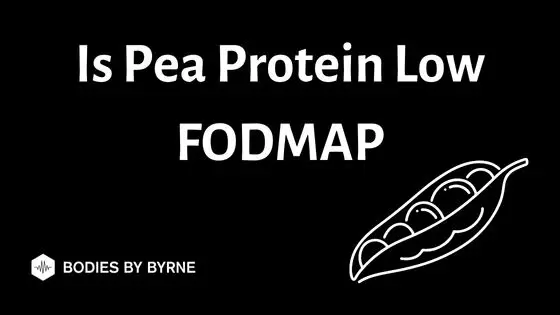Protein powders are supplements that are designed to help people maximize gains, specifically muscle gains, and in recent years they’ve become popular with bodybuilders, athletes, and gym goers.
Due to the popularity of protein powders there’s a range of different types on the market today. One protein option is pea protein, also referred to as pea protein isolate.
Pea protein is derived from peas. It is a high quality protein that can aid with muscle growth and weight loss.
But, picking between these different options can be a challenge, especially when you’re also looking for one that is low FODMAP.
Here, I’ve explained whether or not pea protein is low FODMAP, what quantities are considered as low FODMAP, and whether pea protein is ok for those with IBS.
What Is FODMAP
If you’re unfamiliar, FODMAP stands for fermentable oligosaccharides, disaccharides, monosaccharides and polyols, which are carbohydrates associated with symptoms like bloating and stomach cramps in some people.
Low FODMAP, or FODMAP friendly, foods are often recommended for people with Irritable Bowel Syndrome (IBS), a common digestive condition, as well as small bacterial overgrowth (SIBO), amongst other conditions.
Is Pea Protein Low FODMAP?
Pea protein, also referred to as pea protein isolate, has been tested and certified as low FODMAP by Monash University. This means that it is low FODMAP friendly.
However, this low FODMAP status varies depending on the quantity and brand of pea protein being used.
So the good news is that pea protein has been certified as low FODMAP by Monash University, a research institute that has tested many foods to determine their FODMAP certification. This means that it is low in forms of carbohydrate that can cause symptoms like cramping and bloating in some people.
As it’s derived from peas, pea protein is also vegan friendly unlike other protein powders which require milk such as whey protein.
However, whilst Monash University has certified pea protein as low FODMAP there is a caveat around the brand of pea protein being consumed.
As protein supplements have become more popular, they have been developed by different brands. Different brands use different ingredients alongside the pea protein. They also have different processes for production.
Unfortunately, the inclusion of different ingredients and these different production processes can influence the FODMAP status.
This has led Monash University to revise their certification of pea protein. Essentially, different brands making pea protein are not all certified as low FODMAP.
Therefore, if you’re looking for a low FODMAP pea protein, it’s important to ensure you have a brand and product that has been certified as low FODMAP by Monash University, as not all products will be.
An ingredient’s FODMAP status can also vary due to the quantity, as I’ll go on to explain.
How Much Pea Protein Isolate Is Low FODMAP?
Pea protein should be low FODMAP in quantities of 2 tablespoons or less. Above this quantity, pea protein is higher in FODMAP.
However, it’s important to ensure the brand has been certified as low FODMAP as not all brands will be low, even in low quantities.
When it comes to an ingredient’s FODMAP content, quantity matters. Some foods that are low fodmap are actually high in FODMAP when they’re in larger portions, and vice versa.
Monash University, which has given certifications for foods based on their FODMAP content and developed an app that gives guidance on FODMAP quantities, has previously said that 2 tablespoons of pea protein is low FODMAP.
This means that a serving size of 2 tablespoons should be low FODMAP and should therefore be safe to have if you suffer from IBS.
These 2 tablespoons can be incorporated in different ways, including in shakes, drinks, and other recipes like oatmeal.
However, as I mentioned before, there are a variety of brands that make pea protein.
When different brands make products they often use slightly different ingredients and have different processing and manufacturing techniques and unfortunately this can have a significant influence on the FODMAP rating.
For example, some brands will unfortunately use high FODMAP ingredients in the pea protein powder mix, which obviously influences the rating.
As a result, the FODMAP rating cannot be confidently determined. My recommendation would be to try different brands and assess your individual tolerance to it. Also, check out the Monash University website, or the app, to see which brands are suitable.
Is Pea Protein Okay For IBS?
Pea protein should be ok for those with IBS as it’s low in FODMAP. However, it’s important to consider portion size, as quantities above 2 tablespoons are not low FODMAP, and to have a low FODMAP certified brand, as not all brands are low FODMAP.
To expand on this further, low FODMAP ingredients are often recommended for those with IBS. This is because ingredients with a high FODMAP rating have been associated with worsening IBS symptoms, such as gas, bloating, and stomach pain.
See also – Does pea protein cause gas
When looking for a protein powder, it can be challenging for those with IBS as different types of protein powder can impact IBS symptoms due to the ingredients that they include.
When it comes to pea protein, there has been some confusion around whether it’s ok for those with IBS. This is because peas are high in FODMAP, meaning that in some people they are associated with worsening IBS symptoms.
As a result, sometimes people suffering from IBS may think that they need to avoid any product that is derived from peas, especially during the elimination phase of their low FODMAP diet.
However, whilst peas are high in FODMAP, this does not necessarily mean that pea protein is.
As I’ve mentioned, pea protein has been tested and certified as low FODMAP by Monash University in quantities of 2 tablespoons and below.
Therefore, pea protein should be ok for those with IBS, so long as they follow FODMAP serving guidance and stick to a brand that has been certified as being low FODMAP.
